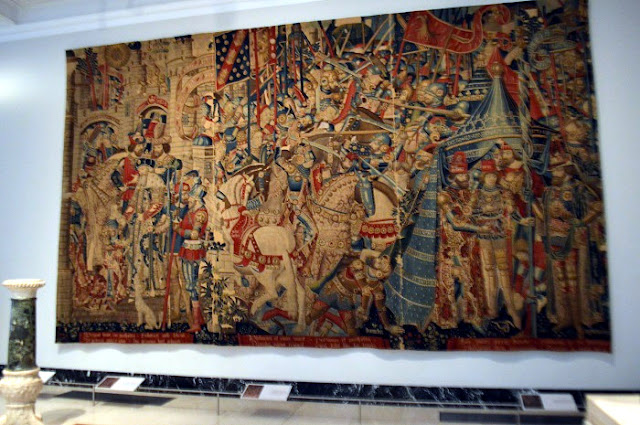The War of Troy tapestry
I just think that this
tapestry is marvellous. I could leave that as my only comment on this post and
it really would be enough. When it comes to assessing the quality of
tapestries, you really only need to know two things. Firstly, the best ones
were made in Belgium and, secondly, the high-water mark for production was the
15th century. This example, taking as its subject the Trojan War, sits exactly
in that Venn diagram intersection. It was made in the Belgian town of Tournai
in the period from 1475 to 1490. In every way, it is the physical manifestation
of tapestry making’s ‘sweet spot’.
 |
| Penthesilea, the Amazon Queen, kneels before Priam, offering her forces to fight against the Greek army. |
Although we don’t know
who this piece was commissioned by, it was in the possession of Charles VIII of
France by 1494, when he paid to have work done to it to cover over the heraldic
devices of the original owner with his own symbol based around a rayed sun. As
(in every sense) majestic as this tapestry is, it was only ninth in an original
series of eleven – what a scene that must have been!
Although the story of
the tapestry series is that of the Trojan War, the interest wasn’t solely
historical or literary. Part of its appeal was that nobles of the period saw the
tales as containing important lessons and morals for their own behaviour. This aspect
of the piece is brought to the fore when we consider that the costumes are not
authentic to ancient Greece and Troy, but are instead a curious muddle of the
classical, the exotic, and the contemporary. As the V&A’s online catalogue
notes, this is ‘all very typical for the late Medieval period when depicting
Classical scenes – in particular the lionheaded shoulder armour and tabbed
skirts.’ Game of Thrones may have finished (for now!) but I find it difficult to look on those soldiers with lion heads on their shoulders and not immediately imagine that they're Lannisters, not Trojans ... and immediately support the other guy!
 |
| Penthesilea’s army in action against the Greeks outside one of the gates of Troy |
For me, one of the
chief attractions of this piece are the lively and realistic faces of so many
of the characters depicted here – both the central players and the ‘extras’.
They have a feeling to them (to me, at least) that they were based on real
people, possibly well known to the original artist. While the identity of the artist
may have been lost, it is known that the Tournai merchant, Pasquier Grenier,
owned the cartoons for the set and supplied versions of the design to a number
of different patrons. I still look at this series and wonder if one of the
faces staring back at me may be either our artist or even Grenier himself … a
well-to-do merchant that made it into the presence of Royalty. We may never
know for sure, but the speculation is too much fun to ignore.
 |
| Priam being armed ahead of battle |









Comments
Post a Comment